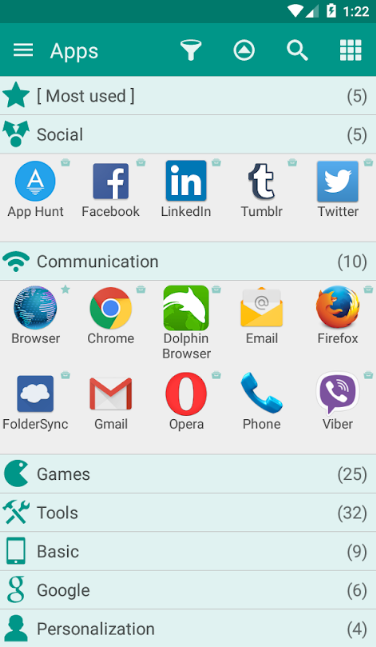Glextor App Manager
Glextor App Manager is an alternative choice to your default app drawer to find and launch apps quicker. It’s key feature groups similar apps by category, i.e. Games, Productivity, Photo, Entertainment, etc. The grouping feature does not happen at first launch, however, you’ll have to tap the icon to the top left to allow the app to automatically filter. Thereafter when you add new apps they get automatically grouped. You can sort by all apps, downloaded apps and favorite apps and these too are sub-grouped. Additionally, you can create, edit and reorder groups; plus backup and restore group settings.

Furthermore, simply tap to open an app or can long-press to reveal more options like; creating shortcuts of apps and groups on the home screen, uninstall (individually or batch uninstall apps), share via Facebook, Gmail or text message, move to another group or view in Google Play. Diving into the settings reveals that you can change of theme (dark/light), navigation type, change icon size & language, grouping options and more.
I’m not a fan of ads in my app drawer, however, so if you try out the freebie version and find it useful you might want to consider the paid version to eliminate these.
I would encourage you to try the free version as it offers the convenience of grouping your apps to make things easier to find versus a long alphabetically organized list of apps offered by default Android and other custom skins many phones have. Though the app does not have a long list of features the few it does offer are worth checking out.
Android Malware
If you’re walking in the mall and someone politely asks you to hand over your watch and other valuables and if you give it to them, have you just been robbed? I mean they did ask for your permission, and did so nicely! The same scenario has been taking place recently with malware on Android smartphones all over the world. Leading many to ask the question, “Is it still malware if it asks permission first?”
According to Google, the answer to these questions is yes. Recently, Google has established tougher guidelines for developers submitting apps to the Play Store in an attempt to cut down on malicious apps surfacing on its Android operating system platform. The new policy will include changes such as new rules on naming apps, more payment policy details and a ban on apps that disclose personal information without permission.
The cause of such changes may be linked to recent reports of malicious malware being hidden in fake Android apps found in the Play Store. Disguised as popular games such as “Super Mario Bros” and “GTA 3 Moscow City”, the malware wasn’t detected and removed until it was downloaded 50,000 to 100,000 times by unknowing consumers.
These apps are not the first to hide behind permissions accepted by consumers and are definitely not the last; even many legitimate apps request the same permissions. For quite some time, Android users have been complaining of excessive permissions. Apps that request excessive permissions to device information, access to personal information, and unusual levels of location information have been available for a long time, and are still available today.
But some say simply creating a new policy just isn’t enough, and Google has to find ways to block spyware apps from reaching the Play Store in the first place. Google has long been criticized for taking a ‘hands-off’ approach by not requiring app developers to go through an approval process when submitting apps, though they have made some small strides with the addition of their automated scanning service known as “Bouncer”.
With the implementation of Bouncer, Google has reported a decrease in malicious apps by almost 40 percent. Bouncer scans new and existing apps for known malware, spyware and Trojans. In addition, it also analyzes new developer accounts to make sure previously rejected developers and ones with a history of questionable apps stay out of the marketplace.
Today, many still criticize Google for choosing openness over user safety by not taking more proactive preventative methods in their Android app security. Recent tests have shown Bouncer’s flaws of not detecting and removing malicious content until after it has already entered the store and been made available for download.
It’s one thing to see malware on other online third party Android app stores, it is something completely different when they start sneaking their way into the official Google Play Store. The ‘openness’ of Google is great, but it may want to take just a few pages from iOS as far as permissions and app approval is concerned to make and keep the Play Store safe for its Android users.